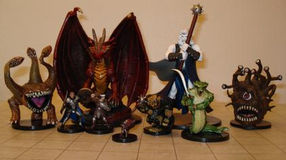Gamestorming #3: Winning?
- Caity Kelly
- Feb 14, 2019
- 2 min read

Upon receiving feedback on my first conceptualization draft of my learning objectives game, something interesting was brought to my attention--the game should have a more objective, clear-cut way of measuring what constitutes "winning." Given my "Apples-to-Apples" and "Cards Against Humanity" inspiration, this was not something I had considered beyond "The round winner is chosen by the judge's discretion."
However, this is something that can be truly important. I have witnessed many a playful-verging-on-serious argument about a judge choosing a winner in games that rely on the judge's opinion. Accusations of player favoritism and choosing "silliness over skill" run rampant in these situations. Most of the time, it is all in good fun; yet there are some times when it can legitimately decrease enjoyment for some or all players.
After pondering this element for some time and working out various ideas for instilling a winning rubric, I have finally come to a conclusion that I believe satisfies both the need for objectivity and the desire for player input on the results. The nature of winning will vary depending on if the learning objective game is being played for fun or if it is being used in a teaching setting. My solution is as follows:
The player who creates the greatest number of learning objective/activity pairs wins the round.
If the learning objective/activity pairs are overtly ridiculous or nonsensical, that player is disqualified from that particular round (to ensure that players make an effort).
If there is a tie (i.e. 2 or more players finish the round with the same number of pairings), the tied players must engage in a bonus round.
In the bonus round, the tied players each draw 1 new Taxonomy Card and 1 new Activity Card. Whoever creates a new pairing with these new cards first is the true winner of the round.
In a genuine learning setting, peers and educators and also welcome to give feedback on whether or not the objectives and activities are sound or not.
Perhaps the game could include instructions for a "casual mode" as well, which uses my original idea of the judge choosing the winner based on their discretion. All in all, there are a multitude of ways to define winning in this game.


Comments